高考湖南卷英语试题解析
2020湖南高考英语试题及答案解析
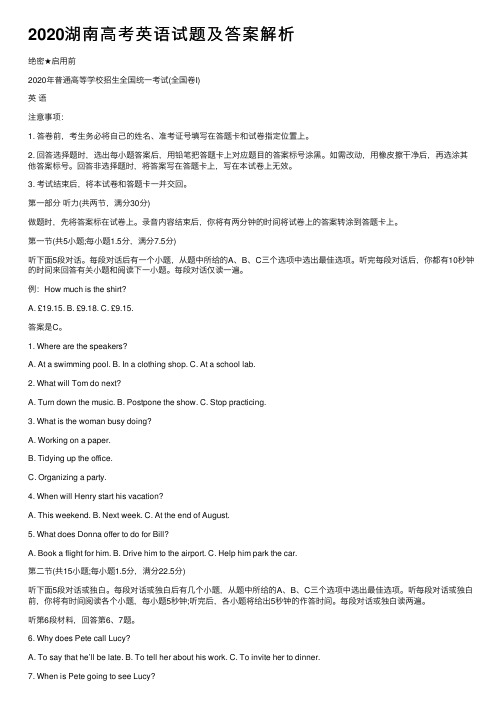
2020湖南⾼考英语试题及答案解析绝密★启⽤前2020年普通⾼等学校招⽣全国统⼀考试(全国卷I)英语注意事项:1. 答卷前,考⽣务必将⾃⼰的姓名、准考证号填写在答题卡和试卷指定位置上。
2. 回答选择题时,选出每⼩题答案后,⽤铅笔把答题卡上对应题⽬的答案标号涂⿊。
如需改动,⽤橡⽪擦⼲净后,再选涂其他答案标号。
回答⾮选择题时,将答案写在答题卡上,写在本试卷上⽆效。
3. 考试结束后,将本试卷和答题卡⼀并交回。
第⼀部分听⼒(共两节,满分30分)做题时,先将答案标在试卷上。
录⾳内容结束后,你将有两分钟的时间将试卷上的答案转涂到答题卡上。
第⼀节(共5⼩题;每⼩题1.5分,满分7.5分)听下⾯5段对话。
每段对话后有⼀个⼩题,从题中所给的A、B、C三个选项中选出最佳选项。
听完每段对话后,你都有10秒钟的时间来回答有关⼩题和阅读下⼀⼩题。
每段对话仅读⼀遍。
例:How much is the shirt?A. £19.15.B. £9.18.C. £9.15.答案是C。
1. Where are the speakers?A. At a swimming pool.B. In a clothing shop.C. At a school lab.2. What will Tom do next?A. Turn down the music.B. Postpone the show.C. Stop practicing.3. What is the woman busy doing?A. Working on a paper.B. Tidying up the office.C. Organizing a party.4. When will Henry start his vacation?A. This weekend.B. Next week.C. At the end of August.5. What does Donna offer to do for Bill?A. Book a flight for him.B. Drive him to the airport.C. Help him park the car.第⼆节(共15⼩题;每⼩题1.5分,满分22.5分)听下⾯5段对话或独⽩。
湖南卷__英语__精品解析:2022年新高考全国一卷英语真题(原卷版)
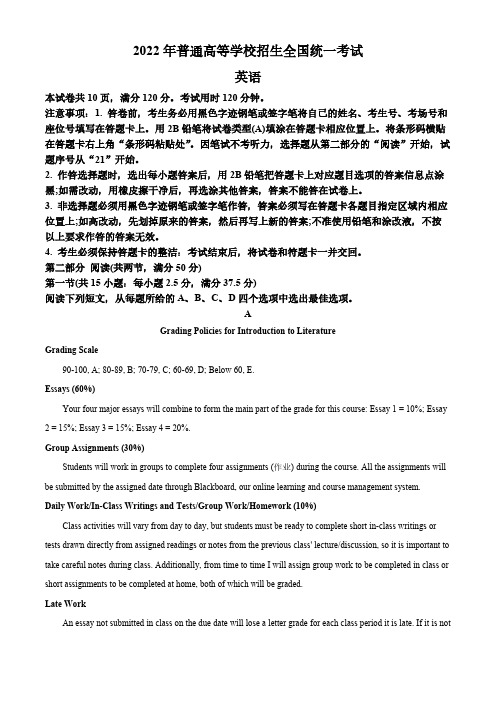
2022年普通高等学校招生全国统一考试英语本试卷共10页,满分120分。
考试用时120分钟。
注意事项:1. 答卷前,考生务必用黑色字迹钢笔或签字笔将自己的姓名、考生号、考场号和座位号填写在答题卡上。
用2B铅笔将试卷类型(A)填涂在答题卡相应位置上。
将条形码横贴在答题卡右上角“条形码粘贴处”。
因笔试不考听力,选择题从第二部分的“阅读”开始,试题序号从“21”开始。
2. 作答选择题时,选出每小题答案后,用2B铅笔把答题卡上对应题目选项的答案信息点涂黑;如需改动,用橡皮擦干净后,再选涂其他答案,答案不能答在试卷上。
3. 非选择题必须用黑色字迹钢笔或签字笔作答,答案必须写在答题卡各题目指定区域内相应位置上;如高改动,先划掉原来的答案,然后再写上新的答案;不准使用铅笔和涂改液,不按以上要求作答的答案无效。
4. 考生必须保持答题卡的整洁:考试结束后,将试卷和符题卡一并交回。
第二部分阅读(共两节,满分50分)第一节(共15小题:每小题2.5分,满分37.5分)阅读下列短文,从每题所给的A、B、C、D四个选项中选出最佳选项。
AGrading Policies for Introduction to LiteratureGrading Scale90-100, A; 80-89, B; 70-79, C; 60-69, D; Below 60, E.Essays (60%)Your four major essays will combine to form the main part of the grade for this course: Essay 1 = 10%; Essay 2 = 15%; Essay 3 = 15%; Essay 4 = 20%.Group Assignments (30%)Students will work in groups to complete four assignments (作业) during the course. All the assignments will be submitted by the assigned date through Blackboard, our online learning and course management system.Daily Work/In-Class Writings and Tests/Group Work/Homework (10%)Class activities will vary from day to day, but students must be ready to complete short in-class writings or tests drawn directly from assigned readings or notes from the previous class' lecture/discussion, so it is important to take careful notes during class. Additionally, from time to time I will assign group work to be completed in class or short assignments to be completed at home, both of which will be graded.Late WorkAn essay not submitted in class on the due date will lose a letter grade for each class period it is late. If it is notturned in by the 4th day after the due date, it will earn a zero. Daily assignments not completed during class will geta zero. Short writings missed as a result of an excused absence will be accepted.1. Where is this text probably taken from?A. A textbook.B. An exam paper.C. A course plan.D. An academic article.2. How many parts is a student’s final grade made up of?A. Two.B. Three.C. Four.D. Five.3. What will happen if you submit an essay one week after the due date?A. You will receive a zero.B. You will lose a letter grade.C. You will be given a test.D. You will have to rewrite it.BLike most of us, I try to be mindful of food that goes to waste. The arugula (芝麻菜)was to make a nice green salad, rounding out a roast chicken dinner. But I ended up working late. Then friends called with a dinner invitation. I stuck the chicken in the freezer. But as days passed, the arugula went bad. Even worse, I had unthinkingly bought way too much; I could have made six salads with what I threw out.In a world where nearly 800 million people a year go hungry, “food waste goes against the moral grain,” as Elizabeth Royte writes in this month’s cover story. It’s jaw-dropping how much perfectly good food is thrown away — from “ugly” (but quite eatable) vegetables rejected by grocers to large amounts of uneaten dishes thrown into restaurant garbage cans.Producing food that no one eats wastes the water, fuel, and other resources used to grow it. That makes food waste an environmental problem. In fact, Royte writes, “if food waste were a country, it would be the third largest producer of greenhouse gases in the world.”If that’s hard to understand, let’s keep it as simple as the arugula at the back of my refrigerator. Mike Curtin sees my arugula story all the time — but for him, it's more like 12 bones of donated strawberries nearing their last days. Curtin is CEO of DC Central Kitchen in Washington, D.C., which recovers food and turns it into healthy meals. Last year it recovered more than 807,500 pounds of food by taking donations and collecting blemished (有瑕疵的) produce that otherwise would have rotted in fields. And the strawberries? Volunteers will wash, cut, and freeze or dry them for use in meals down the road.Such methods seem obvious, yet so often we just don’t think. “Everyone can play a part in reducing waste, whether by not purchasing more food than necessary in your weekly shopping or by asking restaurants to not include the side dish you won’t eat,” Curtin says.4. What does the author want to show by telling the arugula story?A. We pay little attention to food waste.B. We waste food unintentionally at times.C. We waste more vegetables than meat.D. We have good reasons for wasting food.5. What is a consequence of food waste according to the test?A. Moral decline.B. Environmental harm.C. Energy shortage.D. Worldwide starvation.6. What does Curtin’s company do?A. It produces kitchen equipment.B. It turns rotten arugula into clean fuel.C. It helps local farmers grow fruits.D. It makes meals out of unwanted food.7. What does Curtin suggest people do?A. Buy only what is needed.B. Reduce food consumption.C. Go shopping once a week.D. Eat in restaurants less often.CThe elderly residents (居民) in care homes in London are being given hens to look after to stop them feeling lonely.The project was dreamed up by a local charity (慈善组织) to reduce loneliness and improve elderly people’s wellbeing, It is also being used to help patients suffering dementia, a serious illness of the mind. Staff in care homes have reported a reduction in the use of medicine where hens are in use.Among those taking part in the project is 80-year-old Ruth Xavier. She said: “I used to keep hens when I was younger and had to prepare their breakfast each morning before I went to school. ”“I like the project a lot. I am down there in my wheelchair in the morning letting the hens out and down there again at night to see they’ve gone to bed.”“It’s good to have a different focus. People have been bringing their children in to see the hens and residents come and sit outside to watch them. I’m enjoying the creative activities, and it feels great to have done something useful.”There are now 700 elderly people looking after hens in 20 care homes in the North East, and the charity has been given financial support to roll it out countrywide.Wendy Wilson, extra care manager at 60 Penfold Street, one of the first to embark on the project, said: “Residents really welcome the idea of the project and the creative sessions. We are looking forward to the benefits and fun the project can bring to people here.”Lynn Lewis, director of Notting Hill Pathways, said: “We are happy to be taking part in the project. It will really help connect our residents through a shared interest and creative activities.”8. What is the purpose of the project?A. To ensure harmony in care homes.B. To provide part-time jobs for the aged.C. To raise money for medical research.D. To promote the elderly people’s welfare.9. How has the project affected Ruth Xavier?A. She has learned new life skills.B. She has gained a sense of achievement.C. She has recovered her memory.D. She has developed a strong personality.10. What do the underlined words “embark on” mean in paragraph 7?A. Improve.B. Oppose.C. Begin.D. Evaluate.11. What can we learn about the project from the last two paragraphs?A. It is well received.B. It needs to be more creative.C. It is highly profitable.D. It takes ages to see the results.DHuman speech contains more than 2,000 different sounds, from the common “m” and “a” to the rare clicks of some southern African languages. But why are certain sounds more common than others? A ground-breaking, five-year study shows that diet-related changes in human bite led to new speech sounds that are now found in half the world’s languages.More than 30 years ago, the scholar Charles Hockett noted that speech sounds called labiodentals, such as “f” and “v”, were more common in the languages of societies that ate softer foods. Now a team of researchers led by Damián Blasi at the University of Zurich, Switzerland, has found how and why this trend arose.They discovered that the upper and lower front teeth of ancient human adults were aligned (对齐), making it hard to produce labiodentals, which are formed by touching the lower lip to the upper teeth. Later, our jaws changed to an overbite structure (结构), making it easier to produce such sounds.The team showed that this change in bite was connected with the development of agriculture in the Neolithic period. Food became easier to chew at this point. The jawbone didn’t have to do as much work and so didn’t grow to be so large.Analyses of a language database also confirmed that there was a global change in the sound of world languages after the Neolithic age, with the use of “f” and “v” increasing remarkably during the last few thousand years. These sounds are still not found in the languages of many hunter-gatherer people today.This research overturns the popular view that all human speech sounds were present when human beings evolved around 300,000 years ago. ”The set of speech sounds we use has not necessarily remained stable since the appearance of human beings, but rather the huge variety of speech sounds that we find today is the product of acomplex interplay of things like biological change and cultural evolution,“ said Steven Moran, a member of the research team.12. Which aspect of the human speech sound does Damián Blasi’s research focus on?A. Its variety.B. Its distribution.C. Its quantity.D. Its development.13. Why was it difficult for ancient human adults to produce labiodentals?A. They had fewer upper teeth than lower teeth.B. They could not open and close their lips easily.C. Their jaws were not conveniently structured.D. Their lower front teeth were not large enough.14. What is paragraph 5 mainly about?A. Supporting evidence for the research results.B. Potential application of the research findings.C. A further explanation of the research methods.D. A reasonable doubt about the research process.15. What does Steven Moran say about the set of human speech sounds?A. It is key to effective communication.B. It contributes much to cultural diversity.C. It is a complex and dynamic system.D. It drives the evolution of human beings.第二节(共5小题:每小题2.5分,满分12.5分)阅读下面短文,从短文后的选项中选出可以填入空白处的最佳选项。
普通高等学校招生全国统一考试湖南卷(英语)解析版

普通高等学校招生全国统一考试湖南卷(英语)解析版Part Ⅱ Language Knowledge(45 marks)Section A (15 marks)Directions:for each of the following unfinished sentences there are four choices marked A,B,C and D. Choose the one that best completes the sentence.Example:The wild flowers looked like a soft orange blanket _______ the desert.A. coveringB. coveredC. coverD. to coverThe answer is A.21. The ability _______ an idea is as important as the idea itself.A. expressingB. expressedC. to expressD. to be expressed23. The pl ayers _______ from the whole country are expected to bring us honor in this summer game.A. selectingB. to selectC. selectedD. having selected【答案】C【解析】考察非谓语动词做定语的用法。
Select修饰players, 为被动关系,只有C选项表被动。
24. I knew that _______ would over discourage him; he would never give up wanting to be a director.A. somethingB. anythingC. everythingD. nothing27. In 1492, Columbus _______ on one of the Bahama Islands, but the mistook is for an island offIndia.A. landsB. landedC. has landedD. had landed【答案】B【解析】考察时态。
2020年普通高等学校招生全国统一考试英语试题(湖南卷,解析版)
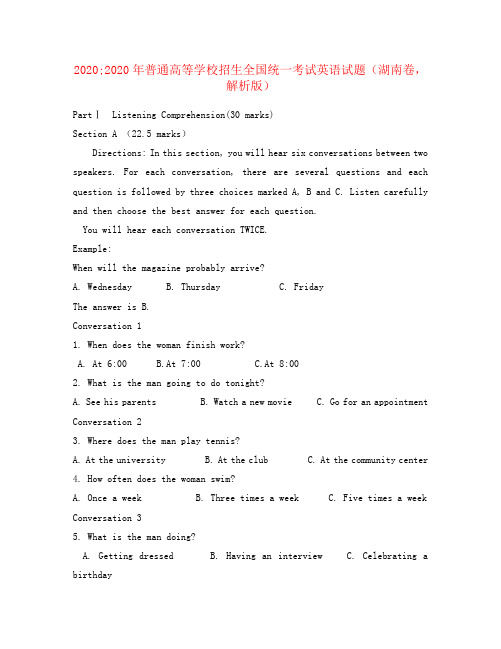
2020;2020年普通高等学校招生全国统一考试英语试题(湖南卷,解析版)PartⅠ Listening Comprehension(30 marks)Section A (22.5 marks)Directions: In this section, you will hear six conversations between two speakers. For each conversation, there are several questions and each question is followed by three choices marked A, B and C. Listen carefully and then choose the best answer for each question.You will hear each conversation TWICE.Example:When will the magazine probably arrive?A. WednesdayB. ThursdayC. FridayThe answer is B.Conversation 11.When does the woman finish work?A. At 6:00B.At 7:00C.At 8:002. What is the man going to do tonight?A. See his parentsB. Watch a new movieC. Go for an appointment Conversation 23. Where does the man play tennis?A. At the universityB. At the clubC. At the community center4. How often does the woman swim?A. Once a weekB. Three times a weekC. Five times a week Conversation 35. What is the man doing?A. Getting dressedB. Having an interviewC. Celebrating a birthday6. What is the probable relationship between the two speaker?A. Parent and childB. Husband and wifeC. Customer and saleswomanConversation 47. Why did the man come back late ?A. He went to the bar.B. He met his teacher.C. He played basketball.8. What did the woman do this morning?A. She took a physics test.B. She had a meetingC. She held a party9. What will the woman probably do after the conversation?A. See her friendsB. Go to the schoolC. Prepare dinner Conversation 510. Where did the woman grow up?A. In Switzerland.B.In the UK.C. In France.11. Which of the following does the woman like best about Weybridge?A. Its sceneryB. Its peopleC.Its facilities12. What does the man do?A.A teacherB.A hostC.A tour guideConversation 613. Why is the woman upset?A. The man didn’t apologizeB. The man didn’t turn up.C. The man didn’t call.14. Who is the man speaking to?A. A waitress.B.A professorC.A doctor15. When will the two speakers see each other?A. On TuesdayB. On ThursdayC. On FridaySection B(7.5 marks)Directions: In this section, you will hear a short passage. listen carefully and then fill in the numbered blanks with the information you have heard. Fill in each blank with NO MORE THAN THREE WORDS.You will hear the short passage TWICE1-5 ACCBA 6-10. BABCA 11-15 CBCBA 16. 90 17. month 18. Reference 19. New Year’s Day 20. ID cardPart Ⅱ Language Knowledge (45 marks)Section A (15 marks)Directions: For each of the following unfinished sentences there are four chokes marked A, B, C and D. Choose the one that best completes the sentence. Example: -'The wild flowers looked like a soft orange blanket _ the desert.A. coveringB. coveredC. cover D, to coverThe answer is A.21. We’ve had a good start, but next, more work needs _____to achieve the final success.A. being doneB. doC. to be doneD. to do【答案】C 【解析】句意:…更多的工作需要去做以取得最后的成功. need做实意动词后接动词作宾语有两种结构: need doing意为“主语需要被做”可以用 need to be done转换; need to do 主语需要(自己)去做;22. Don’t worry. The hard work that you do now ______later in life.A. will be repaidB. was being repaidC. has been repaidD. was repaid【答案】A 【解析】句意:…你现在所做的努力在以后的生活中会有回报的. 显然是将来时态且为被动.23. Time, ________ correctly, is money in the bank.A. to useB. usedC. usingD. use【答案】B【解析】句意:使用得当,时间就是银行里的钱. 要填的是非谓语形式,,而且use和主语time的关系是动宾关系,所以要用过去分词表被动意义,相当一个条件状语从句:if it (time) is used correctly.24. Bicycling is good exercise; _______, it does not pollute the air.A. neverthelessB. besidesC. otherwiseD. therefore【答案】B 【解析】题干前后表示的是叠加意义: 好的锻炼;不污染空气,所以用besides “除了…(还…)”; 答案A意为“然而”;C “要不然”;D“所以”。
2024高考湖南卷英语解析版
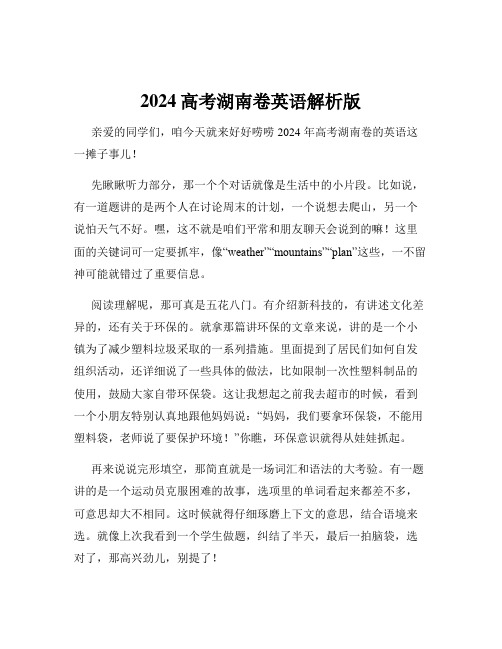
2024高考湖南卷英语解析版亲爱的同学们,咱今天就来好好唠唠 2024 年高考湖南卷的英语这一摊子事儿!先瞅瞅听力部分,那一个个对话就像是生活中的小片段。
比如说,有一道题讲的是两个人在讨论周末的计划,一个说想去爬山,另一个说怕天气不好。
嘿,这不就是咱们平常和朋友聊天会说到的嘛!这里面的关键词可一定要抓牢,像“weather”“mountains”“plan”这些,一不留神可能就错过了重要信息。
阅读理解呢,那可真是五花八门。
有介绍新科技的,有讲述文化差异的,还有关于环保的。
就拿那篇讲环保的文章来说,讲的是一个小镇为了减少塑料垃圾采取的一系列措施。
里面提到了居民们如何自发组织活动,还详细说了一些具体的做法,比如限制一次性塑料制品的使用,鼓励大家自带环保袋。
这让我想起之前我去超市的时候,看到一个小朋友特别认真地跟他妈妈说:“妈妈,我们要拿环保袋,不能用塑料袋,老师说了要保护环境!”你瞧,环保意识就得从娃娃抓起。
再来说说完形填空,那简直就是一场词汇和语法的大考验。
有一题讲的是一个运动员克服困难的故事,选项里的单词看起来都差不多,可意思却大不相同。
这时候就得仔细琢磨上下文的意思,结合语境来选。
就像上次我看到一个学生做题,纠结了半天,最后一拍脑袋,选对了,那高兴劲儿,别提了!语法填空啊,那是规矩多多。
各种时态、语态、非谓语动词,一个不小心就容易出错。
比如说,给你一个动词,你得判断是用现在分词还是过去分词,这就得看这个动作和主语的关系。
有一题说的是“被看到正在做某事”,就得用“be seen doing sth”,不少同学就在这栽了跟头。
短文改错,那就是个“找茬”游戏。
要仔细检查单词拼写、语法错误、冠词使用等等。
有一次我给学生讲这部分,有个学生改了半天都没改对,急得抓耳挠腮,最后在我的提示下终于找到了错误,那如释重负的表情,我到现在都还记得。
最后是写作,这可是展示你英语综合实力的舞台。
今年的作文题目是让你写一封给外国朋友介绍中国传统节日的信。
湖南省2021年高考[英语]考试真题与答案解析
![湖南省2021年高考[英语]考试真题与答案解析](https://img.taocdn.com/s3/m/32ae31f985254b35eefdc8d376eeaeaad1f31699.png)
湖南省2021年高考:英语考试真题与答案解析第一部分:听力第一节:听下面5 段对话。
每段对话后有一个小题,从题中所给的A、B、C 三个选项中选出最佳选项。
听完每段对话后,你都有10 秒钟的时间来回答有关小题和阅读下一小题。
每段对话仅读一遍。
例: How much is the shirt? A. £19.15. B. £9.18. C. £9.15.答案是C。
1. Why did the woman go to Mallorca?A. To teach Spanish.B. To look for a job.C. To see a friend.2. What does the man ask the woman to do?A. Take him to hospital.B. Go to a class with him.C. Submit a report for him.3. Who will look after the children?A. Jennifer.B. Suzy.C. Marie.4. What are the speakers going to do?A. Drive home.B. Go shopping.C. Eat out.5. What are the speakers talking about?A. How to fry fish.B. How to make coffee.C. How to remove a bad smell.第二节:听下面5 段对话或独白。
每段对话或独白后有几个小题,从题中所给的A、B、C 三个选项中选出最佳选项。
听每段对话或独白前,你将有时间阅读各个小题,每小题5 秒钟;听完后,各小题将给出5 秒钟的作答时间。
每段对话或独白读两遍。
听第6 段材料,回答第6、7 题。
6. When does Gomez watch a football game on TV?A. When he fails to get a ticket.B. When the stadium is crowded.C. When his friends are too busy.7. How much did Gomez pay for the football game last time?A. $20.B. $25.C. $50.听第7 段材料,回答第8 至10 题。
全国高考统一考试英语试卷及答案(湖南卷)解析版
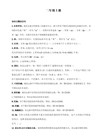
20XX年普通高等学校招生全国统一考试英语(湖南卷)英语第一部分:听力(共三节,满分30分)做听力部分时,请先在试题卷上作答。
听力部分结束前,你将有两分钟的时间将第1至第17小题的答案转涂到答题卡上,将第18至第20小题的答案转写到答题卡上。
第一节(共5小题;每小题1.5分,满分7.5分)听下面5段对话。
每段对话后有一个小题,从题中所给的A、B、C三个选项中选出最佳选项,并标在试题卷的相应位置。
听完每段对话后,你都有10秒钟的时间来回答有关小题和阅读下一小题。
每段对话仅读一遍。
例:How much is the shirt?A. £19.15.B. £9.15.C. £9.18.答案是B。
1.What does the man mean?A. It will take about one month to repair the watch.B. It costs too much to have the watch repaired.C. The watch is no longer worth repairing. 【C】2.When will they get there for the play?A. 9:00.B. 10:00.C. 10:30. 【B】3.Why can’t the man concentrate on his study?A. He keeps thinking of going to the movies.B. His classmates are taking a break.C. He‟s been studying for too long.【C】4.What is the man going to do?A. Go to the Chinese restaurant.B. Watch the football game.C. Visit a friend downtown. 【A】5.What do you know about Frank?A. He will arrive in Chicago this morning.B. He will send Ms. Tyler an e-mail.C. He will call Ms. Tyler himself. 【B】第二节(共12小题;每小题1.5分,满分18分)听下面4段对话。
湖南高三高中英语高考真卷带答案解析

湖南高三高中英语高考真卷班级:___________ 姓名:___________ 分数:___________一、阅读理解You’re sitting on the train home and the person opposite you yawns(打哈欠). Suddenly, you’re yawning with him, though you’re not tired.This phenomenon confused scientists for years until a recent study found that people tend to sympathize with fellow humans. Supporting this claim was the discovery that those children who were unable to form normal emotional ties with others did not experience contagious(有感染力的) yawning, which showed that humans communicate regularly with out words.Hugo Critchley, a neuroscientist, has conducted an experiment recently, which will prove that happiness and sadness can spread like the common cold. According to Critechley, our mind and body are in constant exchange about how we’re feeling. “Emotions are closely linked with states of internal(内部的) responses,” he explained. “ There are also more visible changes in our gestures and facial expression. When we’re in a group, these signals can spread to another person. For example, there’s the obvious tendency to smile when smiled at and there are less obvious changes that reflect emotions of surprise, anger or sadness such as a change in our heart rate and blood pressure.Hugo Critchley further explained, “Our bodies synchronies and when we like the other person, we ever copy his behavior. Next time you chat with a friend, take note of how you’re sitting—it’s pretty likely that you will be the same. Scientists believe it’s our way of telling each other that we’re partners. Through body language, humans give each other very subtle(微妙的) but clear signals that show emotions.”So, what lessons can we learn from this? “ Spend time with happy people— otherwise your health co uld suffer,” said Critchley.” When we’re sad, our body goes into fight or flight mode. But when we’re happy, our body works normally and we feel relaxed and positive. So we look bright, our skin glows, we feel healthy and it affects everyone around us.”【1】 According to Hugo Critchley, ________.A.emotions are as visible as facial expressionsB.we yawn more frequently when we have a coldC.emotions are connected with states of internal responsesD.the change of blood pressure is not linked with the change of emotions.【2】The underlined word “synchronies” in Paragraph 4 means “_____”.A.move slowly B.change rapidly C.relax temporarily D.respond accordingly 【3】From the passage we can learn ________.A.sadness is as contagious as happinessB.anger is less contagious than friendlinessC.surprise is more contagious than smileD.surprise is the most contagious among emotions【4】Which of the following statements is true according to the passage?A.Emotions have delicate influence on fellow humans.B.Children like copying the actions of the fellow humans.C.Scientists are still confused about contagious yawningD.People tend to communicate more with body language.二、单项选择1.Our neighbors gave _____ a baby bird yesterday that hurt ______ when it fell from its nest.A.us, it B.us, itself C.ourselves, itself D.ourselves, it2.Have you heard ______ news?The piece of _______ petrol is going up again!A.the, the B.不填,the C.the, 不填D.不填,不填3.I thought we’d be late for the concert, ______ we ended up getting there ahead of time.A.but B.or C.so D.for4._______ the website of the Fire Department in your city, and you will learn a lot about Firefighting. A.Having searched B.To search C.Searching D.Searchst night Mr. Crook didn’t come back at the usual time. ______, he met some friends and Stayed out until midnight.A.Meanwhile B.However C.Instead D.Yet6.The trees _____ in the storm have been moved off the road.A.being blown down B.blown down C.blowing down D.to blow down 7.— When did you last hear ______ Jay?— He phoned me this morning, and we agreed ______ a time and place to meet.A.of, to B.about, with C.from, with D.from, on8.You don’t have to know the name of the author to find a book. You _____ find the book by the title.A.must B.need C.can D.would9.When asked _____ they needed most, the kids said they wanted to feel important and loved.A.what B.why C.whom D.which10._____ the project as planned, we’ll have to work two more hours a day.A.Completing B.Complete C.Completed D.To complete11.The growing speed of a plant is influenced by a number of factors, _____ are beyond our control.A.most of them B.most of which C.most of what D.most of that12.I called Hnnah many times yesterday evening, but I couldn’t get through. Her brother _____ on the phone all the time!A.was talking B.has been talking C.has talked D.talked13._____ the Internet is of great help. I don’t think it’s a good idea to spend too much time on it.A.If B.While C.Because D.As14.Susan wanted to be independent of her parents. She tried _____ alone, but she didn’t like it and moved back home.A.living B.to live C.to be living D.having lived15.— Do you have any problems if you ______ this job?—Well, I’m thinking about the salary….A.offer B.will offer C.are offered D.will be offered湖南高三高中英语高考真卷答案及解析一、阅读理解You’re sitting on the train home and the person opposite you yawns(打哈欠). Suddenly, you’re yawning with him, though you’re not tired.This phenomenon confused scientists for years until a recent study found that people tend to sympathize with fellow humans. Supporting this claim was the discovery that those children who were unable to form normal emotional ties with others did not experience contagious(有感染力的) yawning, which showed that humans communicate regularly with out words.Hugo Critchley, a neuroscientist, has conducted an experiment recently, which will prove that happiness and sadness can spread like the common cold. According to Critechley, our mind and body are in constant exchange about how we’re feeling. “Emotions are closely linked with states o f internal(内部的) responses,” he explained. “ There are also more visible changes in our gestures and facial expression. When we’re in a group, these signals can spread to another person. For example, there’s the obvious tendency to smile when smiled at and there are less obvious changes that reflect emotions of surprise, anger or sadness such as a change in our heart rate and blood pressure.Hugo Critchley further explained, “Our bodies synchronies and when we like the other person, we ever copy his behavior. Next time you chat with a friend, take note of how you’re sitting—it’s pretty likely that you will be the same. Scientists believe it’s our way of telling each other that we’re partners. Through body language, humans give each other very subtle(微妙的) but clear signals that show emotions.”So, what lessons can we learn from this? “ Spend time with happy people—otherwise your health could suffer,” said Critchley.” When we’re sad, our body goes into fight or flight mode. But when we’re happy, our body works normally and we feel relaxed and positive. So we look bright, our skin glows, we feel healthy and it affects everyone around us.”【1】 According to Hugo Critchley, ________.A.emotions are as visible as facial expressionsB.we yawn more frequently when we have a coldC.emotions are connected with states of internal responsesD.the change of blood pressure is not linked with the change of emotions.【答案】C【解析】根据第三段的“Emotions are closed linked with states of internal responses,”得知C正确。
- 1、下载文档前请自行甄别文档内容的完整性,平台不提供额外的编辑、内容补充、找答案等附加服务。
- 2、"仅部分预览"的文档,不可在线预览部分如存在完整性等问题,可反馈申请退款(可完整预览的文档不适用该条件!)。
- 3、如文档侵犯您的权益,请联系客服反馈,我们会尽快为您处理(人工客服工作时间:9:00-18:30)。
本试卷分为四个部分,共12页。
时量120分钟。
满分150分PartⅠListeningComprehension(30marks)SectionA(22.5marks)Directions:Inthissection,youwillhearsixconversationsbetweentwospeakers.Foreachconversation,thereareseve ralquestionsandeachquestionisfollowedbythreechoicesmarkedA,BandC.Listencarefullyandthenchoosethebestans werforeachquestion.Youwillheareachconversation TWICE.Conversation11.Whendoesthewomanusuallygethomefromwork?A.About6:30.B.About7:30.C.About8:30.2.Whatdidthewomandolastnight?A.ShewatchedTV.B.Sherecordedaprogram.C.Shepreparedforalecture.Conversation23.Howoftendoesthemanexerciseatthegym?A.Everyday.B.Everytwodays.C.Onceaweek.4.WherewillthetwospeakersmeetbeforedoingexercisethisFriday?A.Atthepark.B.Atthecafe.C.Atthecinema.Conversation35.WhatisMr.Chesterdoing?A.Telephoningsomeone.B.Speakingtothewoman.C.Leavingthemanamessage.6.Whatistheman'slastname?A.Oliver.B.Horst.C.Robert.Conversation47.Whywillthewomanbelate?A.Shedidn'tcatchthetrain.B.Shedidn'tfinishherpaper.C.Shedidn'twakeupintime.8.Whereistheman?A.Atthestation.B.Athome.C.Attheoffice.9.Whatistheprobablerelationshipbetweenthetwospeakers?A.Teacherandstudent.B.Parentandchild.C.Husbandandwife. Conversation510.ForwhomdoesthewomanbuytheT-shirt?A.Herself.B.Herhusband.C.Herfriend.11.HowmuchdoestheT-shirtnormallycost?A.$54.B.$60.C.$70.12.WhydoesthesalesmanagreetoselltheT-shirtat$48?A.Itischeaperonline.B.Heisinahurry.C.Abuttonislost. Conversation613.Whendidthewomanarrive?A.Friday.B.Saturday.C.Sunday.14.Whatmajordidthemanchooseintheend?A.English.B.Biology.C.History.15.Whatsuggestiondoesthemangiveonreadingthebooks?A.Makingnotes.B.Skimmingfirst.C.Readingwordbyword.SectionB(7.5marks)Directions:Inthissection,youwillhearashortpassage.Listencarefullyandthenfillinthenumberedblankswiththei nformationyouhaveheard.FillineachblankwithNOMORETHANTHREEWORDS.YouwillheartheshortpassageTWICEPartⅡLanguageKnowledge(45marks)SectionA(15marks)Directions:ForeachofthefollowingunfinishedsentencestherearefourchoicesmarkedA,B,CandD.Choosetheone thatbestcompletesthesentence.21.Itw aswhenwewerereturninghome________Irealizedwhatagoodfeelingitwastohavehelpedsomeoneintrouble.A.whichB.thatC.whereD.how【答案】B【考点定位】考查强调句。
22.Asyougothroughthisbook,you________thateachofthemillionsofpeoplewholivedthroughWorldWarIIhadadifferent experience.A.willfindB.foundC.hadfoundD.havefound【答案】A【考点定位】考查时态。
23.Onlyaftertalkingtotwostudents________thathavingstrongmotivationisoneofthebiggestfactorsinreachinggoals.A.IdiddiscoverB.didIdiscoverC.IdiscoveredD.discovered【答案】B【考点定位】考查only置于句首的部分倒装。
24.Videogamescanbeapoorinfluenceif________inthewronghands.A.toleaveB.leavingC.leaveD.left 【答案】D【考点定位】考查状语从句中的省略问题。
25.Iwasn'tabletohidemyeagernesswhenI________,"Whatdoyouwishmetodonow?"A.askB.haveaskedC.amaskingD.asked 【答案】D【考点定位】考查时间状语的时态。
26.Youhavetoknow________you'regoingifyouaretoplanthebestwayofgettingthere.A.whatB.thatC.whereD.who 【答案】C【考点定位】考查宾语从句。
27.Itisimportanttorememberthatsuccess________asumofsmalleffortsmadeeachdayandoften________yearsofachieve.A.is;takesB.are;takesC.are;takeD.is;take【答案】A【考点定位】考查主谓一致原则28.HemusthavesensedthatI________him.Hesuddenlyglancedatmeandsaidquietly,"Whyareyoustaringatmelikethat?"A.wouldlookatB.lookedatC.waslookingatD.amlookingat【答案】C【考点定位】考查时态。
29.Itisatrulydelightfulplace,________looksthesameasitmusthavedone100yearsagowithitswindingstreetsandprettycott ages..A.asB.whereC.thatD.which【答案】D【考点定位】考查定语从句关系代词。
30.________whatyou’redoingtodayimportant,becauseyou’retradingadayofyourli feforitA.MakeB.TomakeC.MakingD.Made【答案】A【考点定位】考查动词ing作伴随状语。
31.1amlookingforwardtotheday________mydaughtercanreadthisbookandknowmyfeelingsforher.A.asB.whyC.whenD.where【答案】C【考点定位】考查祈使句。
32.Allweneed________asmallpieceoflandwherewecanplantvariouskindsoffruittreesthroughoutthegrowingseasonsoft heyear.A.areB.wasC.isD.were【答案】D【考点定位】考查被动语态。
33.It’snotdoingthethingswelike,butlikingthethingswehavetodo________makeslifehappy.A.thatB.whichC.w hatD.who【答案】C【考点定位】考查连词。
34.Wheneveryou________apresent,youshouldthinkaboutitfromthereceiver’spointofview.A.boughtB.haveboughtC.willbuyD.buy【答案】A【考点定位】考查不定式作宾语补足语。
35.________ourselvesfromthephysicalandmentaltensions,weeachneeddeepthoughtandinnerquietness.A.HavingfreedB.FreedC.TofreeD.Freeing【答案】B【考点定位】考查if引导的条件状语。
SectionB(18marks)Directions:ForeachblankinthefollowingpassagetherearefourwordsorphrasesmarkedA,B,CandD.Fillineachblan kwiththewordorphrasethatbestfitsthecontext.Itwasarainymorningandthechildren,mainlyboyswithvariouslearni ngdifficulties,refusedtosettleforthestartofthelesson. Asaninexperiencedteacher,Itriedeverymeanstogetthemtobe36,butinvain.mypanicwasrisingandIcouldfeelmyheartbeati ngwildly.Thiswasthe37ofmyjobasamusicteacher,Ithought--teachingwasnotforme.ThenIhadanidea.Hopingthatnoone wouldnoticethatIwas38inside,Ithrewmyvoiceasfarasitwouldreach:"Putyourheadsonthedesksandcloseyour39!Weareg oingonajourney."40,thechildrenfellsilent."NowwhatshouldIdo?"Ithoughttomyself.ReachingovertomycollectionofCDs,Iblindly41, putitinthemachineandplayedit.Obediently(顺从地),myclasslaytheirheadsontheirdesk,closedtheireyesand42.Whenthemusicstarted,theroomasfilledwiththemostbeauti fultonesandmusicalcolorsIcouldhaveeverimagined.Allthechildrenwere43.Whenthemusicfinished,Iaskedthemalltoraisetheir44slowlysothatwecouldshareourmusicaljourney.Atthispoint,whenallthechildrenwerewillingtosharetheirexperiences,Ibegantolearnhowto45.Themusicallowmetol earnthatteachingisaboutsharingandrespect,tearsandsmiles,theknowingandthe46andmostofall,anunderstandingofeachother.Thiswasthepowerthat47intheclassroomcouldhave.36A.glad B.safe C.kind D.quiet37.A.end B.aim C.rule D.plan38.A.guessingB.shaking C.responding ughing39.A.eyes B.mouths C.books D.doors40.A.PunctuallyB.Importantly C.Amazingly D.Obviously41.A.passedoneonB.gaveonebackC.turnedoneinD.tookoneout42.A.slept B.nodded C.waited D.continued43.A.talking B.singing C.dancing D.listening44.A.legs B.heads C.arms D.shoulders45.A.teach B.imagine C.playD.understand46.A.unpreparedB.unspokenC.unknown D.unforgotten47.A.games B.music C.tears D.knowledge【考点定位】记事类短文阅读。
